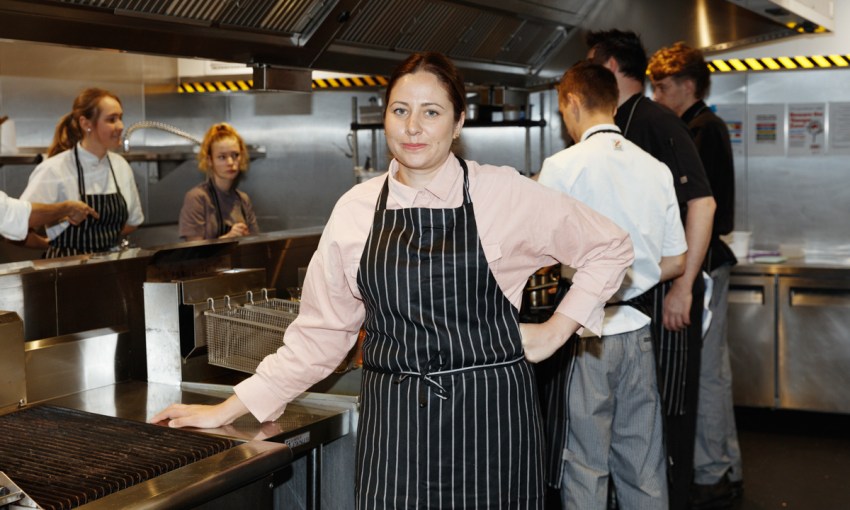After spending 18 years working in kitchens, Emma McCaskill has moved into her most important role yet – shaping the next generation of the hospitality industry.
How Emma McCaskill is creating hospitality’s new future
In June last year, Emma McCaskill left the kitchen at Sparkke at the Whitmore, the business she had recently bought a stake in, and moved into a consultative role with the pub. Emma McCaskill is a 2020 40 Under 40 alumnus.
This allowed Emma to think conceptually about the restaurant, and it also freed her up to study in preparation for a potential move into education.
In May 2021, the chef speaks excitedly to CityMag about what she’s been up to in the last year.
We meet in the Adelaide Institute of Hospitality (AIOH), a culinary school that is part of the Career Employment Group (CEG), where Emma has taken a role as a business development consultant.
Alongside Ben Sharp, the founder of the AIOH, Emma is reforming the way the institute brings young chefs into the hospitality industry.
“I’ve been pretty much thrown into it and have just swum,” Emma laughs.
“It’s definitely not easier [than working in a
kitchen] by any means, it’s still quite a lot of work, but it’s good for this point in time for me.”
Emma’s appointment comes at an important time for the AIOH. The school is scouting for a new space, as it has outgrown its Pirie Street site, and it’s also in the process of setting up an international cooking school housed within Lot Fourteen.
For Emma, this opportunity also comes at a vital time for the hospitality industry.
“There is a staffing crisis at the moment in hospitality,” she says.
“It’s been even before COVID, it’s just not an appealing industry anymore. You work really long hours, you’re not paid a lot for those hours, compared to other industries, so there’s not as many young people wanting to get into it.
“So, ultimately, [for] an employer, it’s hard to find staff.”
Schools have long been a way for restaurants to recruit apprentices. High schools in South Australia offer vocational education and training (VET) programs that lead into the hospitality industry.
This often takes the form of teaching staff from CEG going out into the more than 30 schools it has a connection to throughout South Australia, but Emma wants to see these students given the opportunity to spend time in actual restaurant, hotel and café kitchens.
“It needs to be looked at as a career, not just studying it to get SACE points – particularly if they’re getting a trade certificate at the end of it,” Emma says.
“Those that are serious about a career, they need to be nurtured to make sure that they stay in it and don’t find it too hard and drop out of it.”
As an active chef and known quantity, Emma is using her connections across the state to get kids into restaurants run by good operators who will foster a love for the industry.
“For a student coming into the industry, it’s about the restaurant and the culture of the restaurant, and being able to feel included and a part of a good culture,” she says.
An additional benefit to students is when they do graduate, they’ll enter the industry with a trade certificate and relevant industry experience to back it up.
This has been Emma’s longest time spent away from working in a kitchen in a full-time capacity.
She still feels a gnawing need to cook regularly at events such as Tasting Australia in order to keep her skills up and to remain in touch with the industry, but the opportunity to bring the next generation of South Australian chefs into the industry was too important to pass up.
“A lot of schools are getting a lot of money to build amazing commercial kitchens, and I want to make sure they’re utilising the kitchens to their best potential, so that we’re at the forefront of cooking in the state,” she says.
“I’m doing something with a purpose.”




